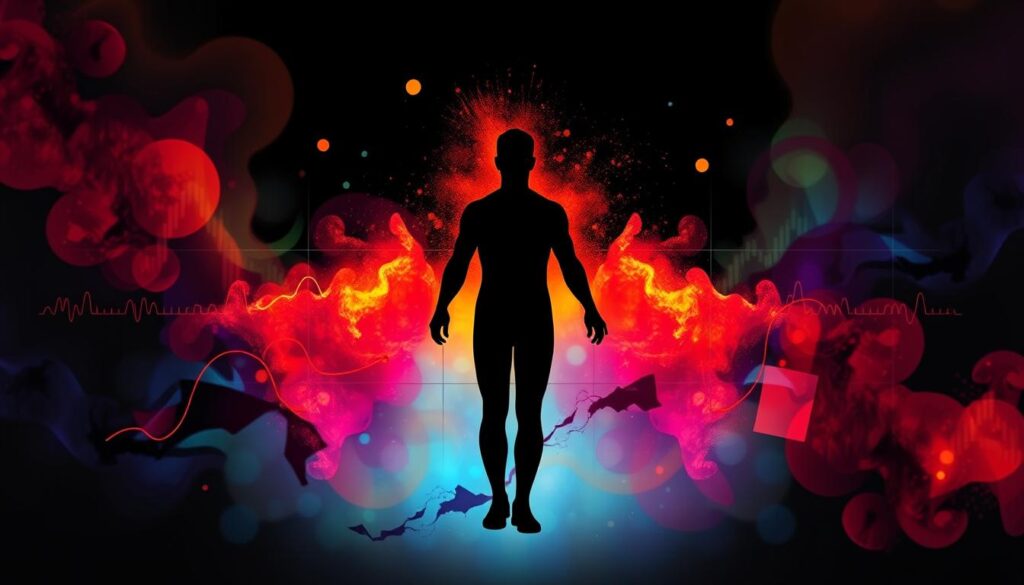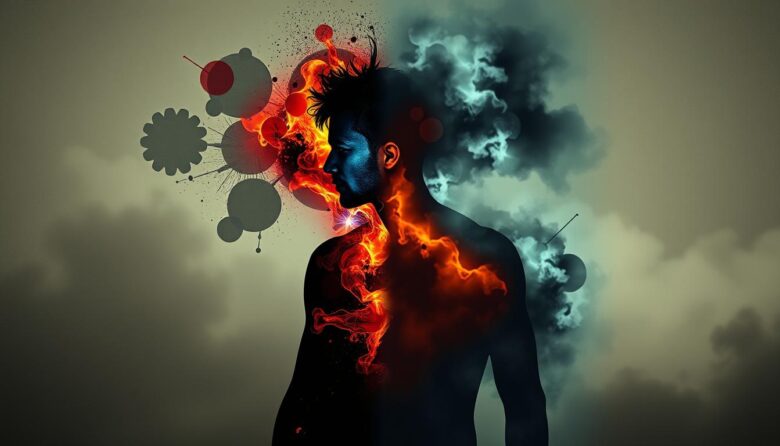As we get older, our testosterone levels drop. This can cause symptoms like depression. We’ll look into how low testosterone affects men over 40 and how it can lead to depression. Start improving your health, hormones, and looks with Dr. John Spencer Ellis on DietGuru.com.
Testosterone levels drop about 1 percent each year after 40. By 55, 30 percent of men face a decline in testosterone. This can cause symptoms like depression, affecting men with low testosterone more than those with normal levels.
Men with low testosterone have levels between 150 to 350 ng per dL. Depression is more common in these men, at 21.7 percent, compared to 7.1 percent in men with normal levels. We’ll see how improving health, hormones, and looks can help.
Key Takeaways
- Testosterone levels decline approximately 1 percent per year after men reach the age of 40 years.
- Age-associated testosterone deficiency is present in 30 percent of men 55 years or older.
- Men with low testosterone levels are at a higher risk of depression.
- The incidence of diagnosed depressive illnesses is 21.7 percent in men with hypogonadism.
- Optimizing health, hormones, and appearance can help to mitigate the effects of low testosterone and depression.
- Testosterone levels have an odds ratio of 1.67 related to the development of depression.
Understanding Testosterone’s Role in Male Health
Let’s look at how testosterone affects men over 40 and depression. Testosterone is the main hormone in men. It affects our body and mood. It helps with metabolism, muscle, and reproductive health.
Testosterone is key for male health. It impacts our sex drive and bone strength. Studies show testosterone therapy can boost energy, sex life, muscle, and brain function in older men.
The Basic Functions of Testosterone
Testosterone does many important things:
- It helps manage weight and metabolism.
- It keeps muscles strong and healthy.
- It supports our sex drive and reproductive health.
- It helps make red blood cells.
- It keeps bones strong.
Normal Testosterone Levels by Age
Testosterone levels drop about 1% each year after 30. Normal levels vary with age. But, levels under 300 ng/dL are considered low for men.
Signs of Testosterone Decline
Decline signs include tiredness, low sex drive, and less muscle. It’s important to notice these signs and see a doctor for help.
The Complex Relationship Between Hormones and Mental Health
Understanding the link between hormones and mental health is key to feeling our best. Looking into how testosterone affects depression in men over 40 shows hormones’ big role. Studies show testosterone might link to depression symptoms like eating issues and trouble sleeping.
A study with 830 elderly men showed a link between low testosterone and depression. This finding shows we need to study hormones and mental health more. For more on this, check out testosterone therapy and depression for the latest research.
Some important findings about testosterone and mental health are:
- Men with lower testosterone levels tend to feel more depressed.
- Testosterone therapy can help some men feel better and less depressed.
- The connection between hormones and mental health is complex. It depends on age, health, and lifestyle.
As we keep learning about hormones and mental health, it’s vital to weigh the pros and cons of treatments. Understanding hormones’ impact on our minds helps us find better ways to fight depression. This way, we can improve our overall well-being.
Testosterone and Depression in Aging Men: The Scientific Evidence
We’ve looked into how testosterone and depression are connected in older men. Now, let’s dive into the science behind it. Research has uncovered the biological reasons and risk factors that lead to depression in this group.
The Testosterone Trials (TTrials) found that testosterone can help with depression in men with low levels of it. But, it didn’t help men with major depression.
Research Studies and Findings
Some important results from the TTrials are:
- Testosterone treatment boosted sexual activity, desire, and function in men with low libido.
- It also increased muscle mass, strength, and leg power.
- Men saw slight gains in climbing stairs, walking, and feeling mobile.
Biological Mechanisms at Play
The link between testosterone and depression is complex. Testosterone affects mood, and low levels are tied to depression.

Risk Factors and Vulnerabilities
Depression in older men can be caused by several factors. These include low testosterone, chronic illnesses, and lifestyle choices. It’s key to tackle these to lower depression risk.
| Risk Factor | Description |
|---|---|
| Low Testosterone | Low testosterone is linked to depression in older men. |
| Chronic Illnesses | Chronic conditions like diabetes and heart disease raise depression risk. |
| Lifestyle Factors | Being inactive and feeling isolated can lead to depression. |
Common Symptoms of Low Testosterone in Men Over 40
As we get older, our testosterone levels drop. This can cause various symptoms. It’s important to know these symptoms to stay healthy. Men over 40 might feel tired, have low sex drive, and lose muscle.
These symptoms can really affect our daily lives. They can make us feel less than our best.
Some common symptoms of low testosterone in men over 40 include:
- Reduced sex drive and erectile dysfunction
- Decreased muscle mass and strength
- Increased body fat
- Decreased bone density
- Hot flashes
- Difficulty concentrating and memory problems
About 30% of men over 40 might have low testosterone symptoms. Also, 25% of men with low testosterone may feel depressed or anxious. It’s key for men over 40 to know these signs and talk to a doctor if they notice them.
Recognizing Depression Signs in Middle-Aged Men
Depression can show up in different ways in middle-aged men. It’s key to know the signs and symptoms. We often focus on physical health, but mental health is just as important. Research shows depression affects 1 in 8 men at some point, and they often report physical symptoms more than emotional ones.
Some common symptoms of depression in middle-aged men include:
- Physical symptoms: fatigue, changes in appetite, and sleep disturbances
- Emotional indicators: low mood, decreased motivation, and irritability
- Behavioral changes: social withdrawal, decreased productivity, and loss of interest in activities
It’s important to remember symptoms of depression must last 2 weeks or more for a diagnosis. If you or someone you know is showing these signs, getting professional help is vital.
By recognizing depression signs and getting help, we can improve our mental health and well-being. Remember, depression is treatable. With the right support and treatment, middle-aged men can manage their symptoms and live a better life.
| Symptoms | Description |
|---|---|
| Physical Symptoms | Fatigue, changes in appetite, sleep disturbances |
| Emotional Indicators | Low mood, decreased motivation, irritability |
| Behavioral Changes | Social withdrawal, decreased productivity, loss of interest in activities |
Medical Testing and Diagnosis Procedures
As we age, our bodies change in many ways. These changes can impact our health. It’s important to get regular medical testing and diagnosis to stay healthy. Understanding testosterone levels is key.
Studies show that testosterone levels in men start to drop after 30. To find out if you have low testosterone, a doctor needs to do a full check-up. The American College of Physicians suggests checking if you need testosterone treatment every year.
Here are some important things to know about medical testing and diagnosis for low testosterone:
- Doctors test for low testosterone on two different days to make sure.
- Testosterone levels are highest in the morning, when blood tests are done.
- Using testosterone supplements can lead to risks like blood clots and acne.
Knowing about medical testing and diagnosis helps us take care of our health. Always talk to a doctor to figure out what’s best for your testosterone needs.
Treatment Options for Low Testosterone and Depression
Managing low testosterone and depression needs a full plan. The World Health Organization says about 280 million people worldwide have depression. Low testosterone can make it worse. Treatments include hormone therapy, antidepressants, and lifestyle changes.
Hormone therapy can help 30% to 50% of men feel better. Antidepressants are also helpful, but finding the right one is key. Adding regular exercise, a healthy diet, and stress control can also help.
Learn more about how inflammation affects men’s health at this resource. Knowing our options helps us take charge of our health.
Low testosterone gets more common with age. About 40% to 50% of men with it feel depressed. Getting medical help and a tailored plan can manage both issues.
| Treatment Option | Effectiveness | Potential Benefits |
|---|---|---|
| Hormone Replacement Therapy | 30% to 50% effective | Improved mood, increased energy |
| Antidepressant Medications | Varies depending on individual | Relief from depressive symptoms |
| Lifestyle Modifications | Significant benefits for overall health | Improved mood, increased energy, reduced risk of chronic diseases |
Natural Ways to Boost Testosterone Levels
As we get older, our testosterone levels drop. This can cause low energy, less sex drive, and higher risks of chronic diseases. But, there are natural ways to boost testosterone, mainly for men over 40. Eating right and staying active are key. Foods rich in protein and healthy fats help a lot.
Working out regularly is also vital for testosterone. Resistance training and high-intensity interval training (HIIT) are great for boosting it. Also, getting enough sleep and managing stress are important. Visit dietguru.com for more on healthy living.
Here are some tips for naturally boosting testosterone:
- Eat a balanced diet with lots of protein and healthy fats
- Do regular exercise, like resistance training and HIIT
- Make sure to sleep 7-9 hours each night
- Use stress-reducing techniques like meditation and deep breathing
By following these natural tips, we can improve our health, even as we age. Healthy testosterone levels are key to avoiding chronic diseases and staying active.
| Age | Testosterone Level |
|---|---|
| 19-30 | Peak levels |
| 30-40 | Gradual decline |
| 40-50 | Noticeable decline |
| 50-60 | Significant decline |
| 60-80 | Low levels |
When to Seek Professional Help
Recognizing the need for professional help is key when dealing with low testosterone and depression. As men get older, testosterone levels drop, causing symptoms like low energy and mood swings. If you’re feeling these effects, it’s time to get professional help from a doctor.
Signs you might need help include feeling sad all the time, losing interest in things you used to love, and changes in sleep or appetite. A doctor can figure out why you’re feeling this way and create a plan to help you. This could include hormone therapy, medication, or changes to your diet and exercise routine.

Some people find relief through natural methods like losing weight and doing resistance exercises. But, always talk to a doctor before starting any new treatment. They can guide you on the best path and make sure you get the professional help you need.
Remember, asking for help is a sign of strength, not weakness. By taking this step, you’re taking control of your health. Don’t wait to reach out to a healthcare professional if you’re dealing with low testosterone or depression. With the right care and support, you can beat these challenges and live a healthier life.
Conclusion: Taking Control of Your Hormonal and Mental Health
Keeping healthy testosterone levels is key for men over 40. It greatly affects both physical and mental health. By managing our hormonal and mental health, we can boost our energy, mood, and life quality.
By taking steps like regular hormone tests, eating well, exercising, and managing stress, we can improve our testosterone. Working with healthcare experts helps us create plans to fix any imbalances. This way, we can reach the best state of hormonal and mental health.
You are in charge of your wellness journey. By focusing on your hormonal and mental health, you can take back control. This boosts your confidence and opens the door to a more vibrant, fulfilling life. Start now to prioritize your well-being and begin a journey towards holistic health and happiness.










